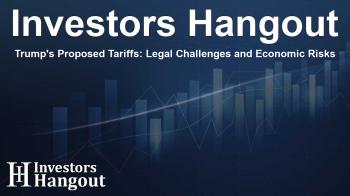Trump's Proposed Tariffs: Legal Challenges and Economic Risks

Trump's Tariff Proposal Raises Legal Concerns
President Donald Trump's recent announcement about imposing a 25% tariff on goods imported from Mexico and Canada by February has sparked a significant debate regarding its legality and potential economic impact. Former New York prosecutor Tristan Snell emphasized that Trump lacks unilateral power to alter tariff rates, stating the necessity of Congressional approval for any significant changes in trade policy.
Legal Framework Governing Tariffs
While the president does possess some executive authorities under acts like the International Emergency Economic Powers Act and sections of the Trade Acts of 1930 and 1974, there are strict legal limitations. For instance:
- IEEPA allows tariffs during national emergencies; however, using it to apply tariffs suddenly is unprecedented and could likely face legal challenges.
- The Trade Act of 1974 limits temporary surcharges on imports to address balance-of-payment issues, capping both the scope and duration of such actions.
- According to the U.S. Constitution, only Congress has the power to implement taxes and duties, throwing Trump's attempts to bypass Congress into a questionable legal territory.
Economists and trade analysts remain skeptical about the potential execution of these tariffs. Historical patterns show that similar proposals during Trump's first term often did not materialize. For instance, Goldman Sachs economist Alec Phillips noted that the chances of the proposed tariffs actually being imposed remain low, estimating a mere 20% likelihood.
Potential Economic Impact on U.S. States
Should these tariffs be enacted, states that heavily rely on trade with Canada and Mexico, like Texas, California, and Michigan, may endure significant disruptions in their supply chains. These areas, particularly the automobile industry, could face severe consequences from escalating production costs. Agricultural states such as Iowa, which export a large amount of goods to Mexico, could also see retaliatory tariffs that would endanger farmers' livelihoods.
Moreover, everyday consumer products like groceries and beverages could experience price hikes, worsening the inflation crisis for residents. The ripple effects would permeate businesses engaging in cross-border trade, threatening jobs in retail, industry, and agriculture across multiple states.
Pushing Back: Canada and Mexico Respond
In light of these developments, Canadian Prime Minister Justin Trudeau has made it clear that Canada is prepared to respond with equivalent tariffs if necessary, underscoring the importance of maintaining healthy trade relationships. Trudeau indicated that the U.S. could face repercussions if it opts to alienate its closest trading partners, potentially forcing a dependency on countries that may not share the same values as Canada.
On the other hand, Mexican President Claudia Sheinbaum adopted a more diplomatic approach, focusing on the significance of maintaining cordial relations while asserting Mexico's autonomy. Both leaders recognize that tariffs could result in economic downturns for their nations.
Despite President Trump's strong stance that these proposed tariffs aim to protect American jobs and industries while addressing issues like illegal immigration and drug trafficking, concerns over the real economic ramifications loom large. The debate surrounding these tariffs is far from settled as Congress faces pressure to make choices that could ultimately affect local economies.
What Lies Ahead?
As the administration intensifies its aggressive trade initiatives, many are left wondering whether GOP lawmakers will support these tariffs, given their possible adverse effects on local economies. With different stakeholders weighing in and the implications of legal complexities growing, it is clear that this tariff policy will continue to create widespread discussion and contention across national and economic landscapes.
Frequently Asked Questions
What are the main concerns regarding Trump's proposed tariffs?
The primary concerns center around the legality of the tariffs, the need for Congressional approval, and their potential negative impact on local economies that rely on trade with Canada and Mexico.
How might these tariffs affect consumers?
Consumers could see increases in prices for everyday goods such as groceries and beverages, contributing to ongoing inflation and potentially reducing disposable income.
What has been the response from Canada and Mexico?
Canadian Prime Minister Trudeau has indicated that Canada will respond with equal tariffs if necessary, while Mexican President Sheinbaum highlights the importance of diplomacy and mutual economic interests.
Will Congress support Trump's tariff policy?
It remains uncertain whether GOP lawmakers will back the tariffs due to possible harm to local economies, especially in states that significantly depend on cross-border trade.
What is the likelihood that these tariffs will be implemented?
Many economists, including those from Goldman Sachs, believe that the chances of the proposed 25% tariffs being implemented are low, estimating about a 20% likelihood.
About The Author
Contact Riley Hayes privately here. Or send an email with ATTN: Riley Hayes as the subject to contact@investorshangout.com.
About Investors Hangout
Investors Hangout is a leading online stock forum for financial discussion and learning, offering a wide range of free tools and resources. It draws in traders of all levels, who exchange market knowledge, investigate trading tactics, and keep an eye on industry developments in real time. Featuring financial articles, stock message boards, quotes, charts, company profiles, and live news updates. Through cooperative learning and a wealth of informational resources, it helps users from novices creating their first portfolios to experts honing their techniques. Join Investors Hangout today: https://investorshangout.com/
The content of this article is based on factual, publicly available information and does not represent legal, financial, or investment advice. Investors Hangout does not offer financial advice, and the author is not a licensed financial advisor. Consult a qualified advisor before making any financial or investment decisions based on this article. This article should not be considered advice to purchase, sell, or hold any securities or other investments. If any of the material provided here is inaccurate, please contact us for corrections.

